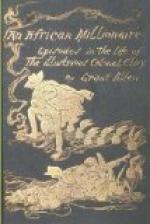He took them both off, and handed them to Charles. No man in England is a finer judge of gems than my brother-in-law. I watched him narrowly. He examined them close, first with the naked eye, then with the little pocket-lens which he always carries. “Admirable imitation,” he muttered, passing them on to Amelia. “I’m not surprised they should impose upon inexperienced observers.”
But from the tone in which he said it, I could see at once he had satisfied himself they were real gems of unusual value. I know Charles’s way of doing business so well. His glance to Amelia meant, “These are the very stones you have so long been in search of.”
The Scotch lassie laughed a merry laugh. “He sees through them now, Dick,” she cried. “I felt sure Sir Charles would be a judge of diamonds.”
Amelia turned them over. I know Amelia, too; and I knew from the way Amelia looked at them that she meant to have them. And when Amelia means to have anything, people who stand in the way may just as well spare themselves the trouble of opposing her.
They were beautiful diamonds. We found out afterwards the little curate’s account was quite correct: these stones had come from the same necklet as Amelia’s rivière, made for a favourite wife of Tippoo’s, who had presumably as expansive personal charms as our beloved sister-in-law’s. More perfect diamonds have seldom been seen. They have excited the universal admiration of thieves and connoisseurs. Amelia told me afterwards that, according to legend, a Sepoy stole the necklet at the sack of the palace, and then fought with another for it. It was believed that two stones got spilt in the scuffle, and were picked up and sold by a third person—a looker-on—who had no idea of the value of his booty. Amelia had been hunting for them for several years to complete her necklet.
“They are excellent paste,” Sir Charles observed, handing them back. “It takes a first-rate judge to detect them from the reality. Lady Vandrift has a necklet much the same in character, but composed of genuine stones; and as these are so much like them, and would complete her set, to all outer appearance, I wouldn’t mind giving you, say, 10 pounds for the pair of them.”
Mrs. Brabazon looked delighted. “Oh, sell them to him, Dick,” she cried, “and buy me a brooch with the money! A pair of common links would do for you just as well. Ten pounds for two paste stones! It’s quite a lot of money.”
She said it so sweetly, with her pretty Scotch accent, that I couldn’t imagine how Dick had the heart to refuse her. But he did, all the same.
“No, Jess, darling,” he answered. “They’re worthless, I know; but they have for me a certain sentimental value, as I’ve often told you. My dear mother wore them, while she lived, as ear-rings; and as soon as she died I had them set as links in order that I might always keep them about me. Besides, they have historical and family interest. Even a worthless heirloom, after all, is an heirloom.”




